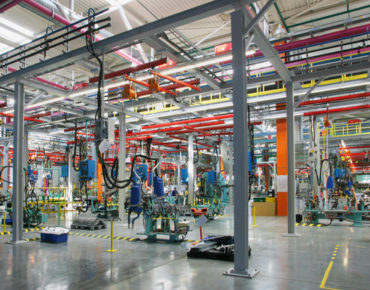Google Cloud, Siemens Boosting AI Processes for Manufacturing in New Collaboration

Developing and integrating new AI innovations to improve industrial manufacturing processes and productivity on factory floors is the aim of a new partnership between Google Cloud and Siemens AG.
The companies will combine Google Cloud’s data cloud and artificial intelligence and machine learning capabilities with Siemens’ broad range of industrial automation products to build scalable and targeted AI services that can help manufacturers around the world improve their processes.
Among the tasks where AI could be used to make improvements are for visual inspections of products or predicting the wear-and-tear of machines on assembly lines, according to the companies.
One of the major problems today with early AI projects in factories is that they are typically scattered as pilot initiatives across the facilities, which are having a tough time implementing AI at scale because the technology is still developing.
That’s one of the challenges the partnership wants to target, Dominik Wee, the managing director of manufacturing and industrial at Google Cloud, told EnterpriseAI. “We're integrating our complementary capabilities in a way that makes it easier for customers to deploy them in combination,” said Wee. “The next step is to approach customers for co-creation and deployment. We’ll experiment together, learn from each other, and hopefully create a leap in productivity for our customers.”
The partnership aims to help factories harmonize their factory data and then run cloud-based AI/ML models on top of the data, while deploying algorithms at the network edge to drive improvements in processes and productivity. Other benefits would include using AI to empower employees as they work on the plant floor while automating mundane tasks and improving overall production quality.
Several off-the-shelf AI products from Google Cloud, including Vision AI, Dialogflow and Recommendations AI, will be used as building blocks for new joint products and services with Siemens to address common factory automation use cases, such as quality control, energy efficiency and more, said Wee. Additional joint innovations and services will continue to be developed and offered as they are ready, he said.
“The manufacturing industry hasn’t yet benefited from cloud and AI technology to the same extent as other verticals, and we’re trying to change that,” said Wee. “We want to accelerate the adoption of AI for manufacturers. By tightly integrating the two companies’ technology stacks, deploying AI at scale will become much easier, empowering employees as they work on the plant floor, automating mundane tasks and helping prevent mistakes before they become more serious issues.”
For both companies, bringing together their products and services was a natural fit, said Wee. “The tight integration of Google Cloud AI capabilities into the Siemens Factory automation stack will make it very easy for companies to use AI within a factory environment.”
Axel Lorenz, a vice president of control and factory automation at Siemens Digital Industries, said in a statement that the work of the partners will be a game changer for the manufacturing industry. “The potential for artificial intelligence to radically transform the plant floor is far from being exhausted. Many manufacturers are still stuck in AI ‘pilot projects’ today – we want to change that.”
Analyst Dan Maycock, principal of engineering and analysis at Loftus Labs, said that while the goals of the new partnership are intriguing, some industrial companies may not buy in right away.
“I think there are manufacturers out there that will get nervous about how accessible this data will become, given the concerns many have with Google’s privacy policies,” said Maycock. “Larger manufacturing companies have already embraced the cloud, and no doubt Siemens and Google have safeguards in place given the move – however, I only see a fraction of the total AI/ML space for these companies going to Siemens/Google given the increasingly proprietary and competitive nature of these projects over time.”
At the same time, Maycock said he envisions more AI partnerships occurring in the future, especially due to a shortage of AI experts in various industries.
“Companies will develop a strategy about what’s the most commoditized functions and problems to host externally, versus the ones that are most important to build the expertise around and support in-house,” said Maycock. “On-premises versus off-premises is less of a concern … but more companies like Siemens and Google want to do the heavy lifting themselves around AI/ML. That means less of the work is done in-house by a given [customer]. It’ll become critical to know what to keep versus what to gradually handle through a third party.”
Where Maycock does see the partnership adding value is through processes and applications that can enable predictive maintenance for industrial plants.
“As areas like connectivity become less of an issue for remote manufacturing facilities and companies, and industrial IoT becomes more proliferated, then we will see more areas like predictive maintenance become the norm as a commoditized function that presents a beachhead for more sophisticated uses of AI/ML to take place over time,” he said.
Farm tractor and construction equipment manufacturer John Deere recently unveiled its own in-factory initiative that uses AI to find and quickly fix defective welds as they occur on robotic assembly lines in one of the company’s 52 global plants. The pilot project, which is being done with Intel Corp., uses AI computer vision to find the problems, which can then be resolved without having to scrap expensive assemblies late in production.













